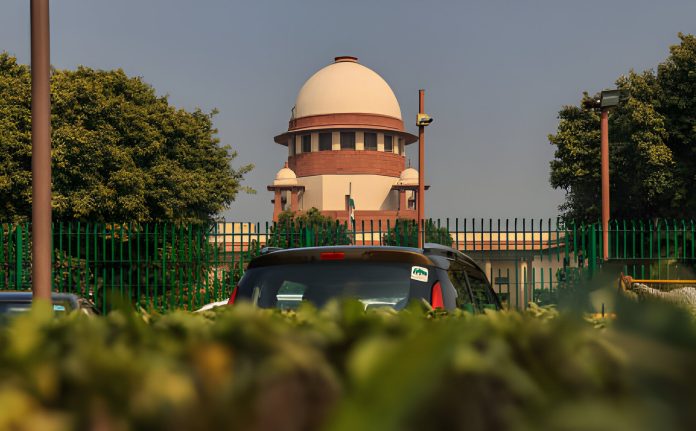NEW DELHI, May 14: In a significant verdict, the Supreme Court on Tuesday held the lawyers do not come within the purview of Consumer Protection Act and cannot be sued for “deficiency in service” before the consumer courts.
Follow the Daily Excelsior channel on WhatsApp
The top court said a considerable amount of direct control is exercised by the client over the manner in which an advocate renders his services during the course of his employment.
The services hired or availed of an advocate would be that of a contract “of personal service” and would, therefore, stand excluded from the definition of “service”, it said.
A bench of justices Bela M Trivedi and Pankaj Mithal said the legal profession is sui generis (unique) and the nature of work is specialised and cannot be compared with other professions.
The top court said the very purpose and object of the Consumer Protection Act 1986 as re-enacted in 2019 was to provide protection to the consumers from unfair trade practices and unethical business practices, and the legislature never intended to include either the professions or the services rendered by the professionals within the purview of the said Act.
“A service hired or availed of an advocate is a service under ‘a contract of personal service’, and therefore would fall within the exclusionary part of the definition of ‘Service’ contained in Section 2 (42) of the Consumer Protection Act, 2019. A complaint alleging ‘deficiency in service’ against Advocates practising legal profession would not be maintainable under the Consumer Protection Act , 2019,” the bench said.
The judgment came on a plea filed by the bar bodies and other individuals challenging a 2007 verdict of the National Consumer Disputes Redressal Commission (NCDRC), which has ruled that advocates and their services come under the purview of the Consumer Protection Act, 1986.
The top court said the object of the Consumer Protection Act was to provide to the consumers timely and effective administration and settlement of their disputes.
“If the services provided by all the professionals are also brought within the purview of the Act, there would be flood-gate of litigations in the commissions/forums established under the Act, particularly because the remedy provided under the Act is inexpensive and summary in nature,” the bench said.
Observing that the legal profession cannot be equated with any other traditional professions, the bench said it is not commercial in nature but is essentially a service-oriented and noble profession.
“It cannot be gainsaid that the role of Advocates is indispensable in the Justice Delivery System. An evolution of jurisprudence to keep our Constitution vibrant is possible only with the positive contribution of the Advocates. The Advocates are expected to be fearless and independent for protecting the rights of citizens, for upholding the Rule of law and also for protecting the Independence of Judiciary.
“People repose immense faith in the Judiciary, and the Bar being an integral part of the Judicial System has been assigned a very crucial role for preserving the independence of the Judiciary, and in turn the very democratic set up of the Nation. The advocates are perceived to be the intellectuals amongst the elites and social activists amongst the downtrodden,” it said.
That is the reason they are expected to act according to the principles of “uberrima fides” — the utmost good faith, integrity, fairness and loyalty while handling the legal proceedings of his client, it added.
The top court said being a responsible officer of the court and an important adjunct of the administration of justice, an advocate owes his duty not only to his client but also to the court as well as to the opposite side.
“The legal profession is different from the other professions also for the reason that what the Advocates do, affects not only an individual but the entire administration of justice, which is the foundation of the civilised society. It must be remembered that the legal profession is a solemn and serious profession,” it said.
The apex court said the legal profession has always been held in very high esteem because of the stellar role played by the stalwarts in the profession to strengthen the judicial system in the country.
“Therefore, having regard to the role, status and duties of the Advocates as the professionals, we are of the opinion that the legal profession is sui generis i.E., unique in nature and cannot be compared with any other profession,” it said.
In its 2007 judgment, the consumer commission held that advocates come under the purview of the Consumer Protection Act and can be sued in a consumer court by their clients for any deficiency in service.
The national consumer forum’s verdict had held that the legal services rendered by lawyers would come within the ambit of section 2(1)(o) of the 1986 Act.
Section 2(1)(o) of the Act defines the word “service” to mean a “service of any description, which is made available to potential users and includes, but not limited to, the provision of facilities in connection with banking, financing insurance, transport, processing, supply of electrical or other energy, board or lodging or both, housing construction, entertainment, amusement or the purveying of news or other information, but does not include the rendering of any service free of charge or under a contract of personal service”.
The top court, however, stayed the August 6, 2007 verdict of the NCDRC in April 2009. (PTI)


